Newsletter


Our Newsletter
Connections
May
4
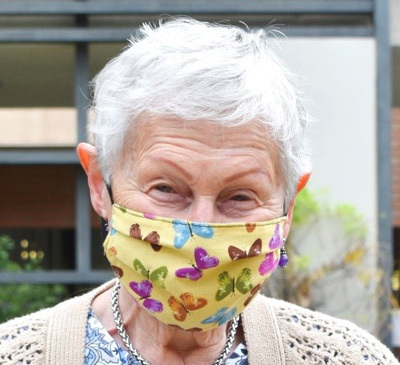
Eyes Can Smile
Until recently, I never fully appreciated how eyes can smile. I knew that eyes could see. I even knew that eyes could connect, as when two people really pay attention to one another. Over this past year, eyes over masks that conveyed sadness and longing had been heavy for our hearts to bear. We all know this—we have been in it together.
So you can imagine how exhilarating it has been, over these past few weeks, to witness smiling eyes. Family visitors smile with their eyes, staff smile with their eyes, and most importantly, our residents are smiling again, even if with their eyes. "Open my eyes that I may perceive the wonders of Your teaching," says the Psalmist (119:18).
Learning in person, not only in some schools, but also here at the Home has resumed. Recently, I was teaching a class about Jewish views on justice. A resident became so excited as she shared her opinions and ideas that she started to pull down her mask. For a split second, I saw that she was wearing lipstick! Even though she wears a mask and we cannot typically see her smiling mouth, she could see her own lips. I reassured her, "You can keep your mask on. I can hear you with my ears and by looking at your eyes."
Coming soon is the Jewish holiday of Shavuot, the holiday when we stand again at Mount Sinai, as it were, and joyfully accept the Torah and Ten Commandments as our ancestors did originally. In light of the upcoming holiday I want to share with you what I have seen and what I see now at our extraordinary Los Angeles Jewish Home.
Remember at Passover, we used our imaginations to "remember" we were slaves in Egypt? We remembered that bitterness of slavery and the sense of longing to leave those terrible conditions. COVID-19 was a sort of Egypt for our residents, as their normal activities and freedoms were unavailable for their own safety.
After Passover, we count the days to Shavuot. We continue in the realm of imagination. Sure, we were slaves, but now we are free. We have a purpose, to journey towards the promised land. And on that journey we stand together at Mount Sinai, connected with each other and with G-d, to receive the Torah.
The eyes of joy that I see today remind me of the exhilaration of Mount Sinai. It is as if a light that had been a bit dimmed has begun to burn brighter, like the rays of light radiating above the eyes of Moses as he comes down the mountain to present the gift.
Thank you to all of you who have given the gift of visits, support, and love of the Los Angeles Jewish Home. Those smiling eyes are in large part because of you.
Rabbi Karen Bender
Apr
20
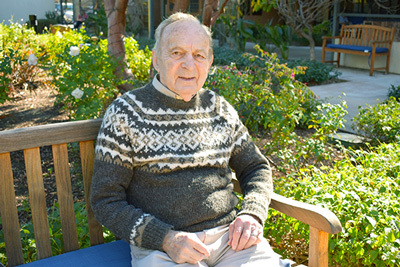
The Los Angeles Jewish Home Honors Survivors on Holocaust Remembrance Day
Yom HaShoah, or Holocaust Remembrance Day, which took place on Thursday, April 8th, is an occasion for solemn contemplation. To reflect on the horrors of the campaign to kill millions of Jews and others is to acknowledge mankind’s ability to do evil. And yet, says Holocaust survivor and Los Angeles Jewish Home resident Joseph Neustadt, it is also a time for hope.Joseph Neustadt. Photo taken prior to COVID-19 pandemic.
"When we talk about our memories of the war, we make sure that, when we die, the stories will stay alive—and that means we can stop the same thing from happening again" he says.
Born in Latvia, Joseph, who is 93, still remembers his experience vividly. "In 1941, the Nazis killed most of the women and children in Riga (the Latvian capital); that’s when they took my mother and my sisters. But there was a small ghetto for working men, and I joined my father and my brother there. I was about 13 years old," he says. "Two years later, they liquidated the ghetto and sent us to Stutthof, a concentration camp in Germany."
While they were in the camp, Joseph, his brother, and his dad noticed the Nazis would often look over the Jewish prisoners, sending some to the left and others to the right. During one such review, Joseph’s father was sent to the left—and Joseph never saw him again.
As time dragged on, Joseph was shuttled off to various camps until his liberation in 1945—coincidentally, from a camp located in a town with the same name as his: Neustadt. "My brother died 13 days after the liberation, from typhus," he recalls. "That left me as the only survivor in my family."
Joseph’s journey took him from Germany, to Holland, to Canada, and eventually to Los Angeles. He settled in West Hills, where he raised a family with his wife, Arlene, and worked for 30 years as an electrician at McDonnell Douglas.
Today, Joseph, who is twice widowed, is happily settled in at the Jewish Home, where he has lived for the past four years. When he arrived at the Home, he found himself in the company of other survivors like fellow resident, 93 year-old Joshua Kaufman.
Like Joseph, Joshua readily shares his story with all who will listen. A survivor of five concentration camps, including Auschwitz and Dachau, he often thinks back to what his fellow inmates would say to each other during their internment: "If you survive, don't let people forget what the Nazis did." Joshua has stayed true to his word.
When he talks about his past, Joshua is instantly transported back to the day he was liberated in 1945. "I was at Dachau when General Eisenhower came. I saw him from 10 feet away. He was crying as he surveyed the camp, saying, 'If I hadn't seen all the skeletons, I would never have believed something like this could happen,'" Joshua remembers.
From captivity in Germany, he went to Israel, eventually joining the Israeli army. His military career included deployment to the Suez Canal as well as service in the Six-Day War and 1973 Yom Kippur War. Later, in 1975, he took a trip to California with a friend and met the woman who would become his wife.
"Margaret was so beautiful," Joshua says. "We fell in love after three days, and got married in two weeks, and I decided to stay in California."
The couple are now both Jewish Home residents (Margaret for the past nine years; Joshua moved in this year), and Joshua continues to speak the truth of what he lived through in Europe all those years ago. "I believe in educating people—trying to raise this new generation and helping them understand what happened," he says.
Education is also critically important to Frieda Thompson, another survivor who lives at the Jewish Home. For her, learning is a way to overcome the tragedy of the Holocaust and deny the Nazis the victory they sought.Frieda Thompson. Photo taken prior to COVID-19 pandemic.
"Even after the Gestapo came and took my father to Buchenwald, my mother—who stayed with us—was very interested that my brothers still go to school," Frieda says. "When my older brother turned 14, my mother said, 'I want him to be bar mitzvahed before the Nazis take us,' and she made arrangements with the synagogue and the rabbi to have the ceremony. It says how much it meant to her that he become a bar mitzvah even during this time."
To keep her parents' memory alive—and in defiance of the Nazi's Final Solution—Frieda decided to become a Bat Mitzvah herself at the Jewish Home. She is currently studying, preparing, and training for her upcoming Bat Mitzvah. "When I was young, women couldn't do it, but now I think it's a wonderful thing," she says.
The Jewish Home honors and salutes Frieda, Joshua, and Joseph—and every Holocaust survivor here at the Home and beyond—for their incredible perseverance and for helping all of us make Yom HaShoah a day never to be forgotten.
Apr
20
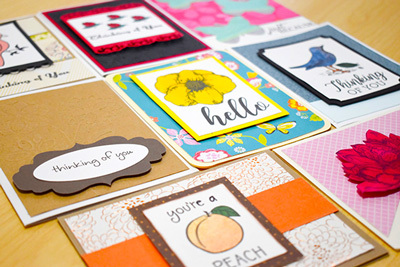
Los Angeles Jewish Home Salutes All Volunteers
Each April, organizations around the country celebrate National Volunteer Week, recognizing the hardworking people who give their time and energy to make a positive difference in their communities. Volunteers at the Los Angeles Jewish Home go above and beyond—and this year, we salute their service with particular gratitude for their efforts to keep our seniors safe and healthy during the pandemic.
"On an annual basis, we typically benefit from approximately 500 volunteers," says Stacy Orbach, the Jewish Home's director of volunteer services. "In addition to individuals, we also receive volunteer assistance from school groups, synagogue and church groups, fraternities and sororities, summer camps, companies, and more. They represent a wide range of backgrounds and ages. It's so wonderful to see people come together to enrich our residents' lives."
COVID-19 complicated volunteer work at the Jewish Home, but volunteers persevered. Although in-person visits to the Home were temporarily not allowed as a safety measure, volunteers found creative ways to keep giving back, letting residents know they had not been forgotten.
"It's been a challenging time, and volunteers haven't been able to come on our campuses, but they've still 'shown up' in many amazing ways," Stacy says. "Volunteers collected special items that our residents love, including cute calendars and sweet treats, delivered them with love. When the quarantine began, and there was a need for masks and gowns, I posted our need on the websites of local sewing groups, and suddenly we had 50 or 60 people donating their talents and sending us homemade/sewn facemasks. The community of volunteer seamstresses also sewed thousands of sleeves onto hospital gowns as part of the Home's 'Gown Kit' campaign. We also have one volunteer who comes by every month to change residents' watch batteries, free of charge—she sets up a little workshop in her car."
The volunteers' generosity, Stacy says, has been incredible. "One member of The Guardians support group works for an online flower company. She said she wanted to send us roses for Love and Friendship Day, which we celebrate every February 14th. I shared that in order for every resident to get one flower, we'd require 500 of them; she sent us 800 entire bouquets instead," she enthuses. "Our residents were overwhelmed with the kindness—it was so meaningful for them!"
Stacy says she has been moved by all of the volunteers staying in touch. "I have volunteers emailing me and asking when they will be able to return to their volunteer positions with the residents. They're eager to resume the valuable work they do and to contribute to the well-being of our residents. They're also anxious to assist our staff, whom they know are putting in so many hours to make sure residents are well-cared for and happy," she says.
Typically, during National Volunteer Week, the Jewish Home organizes an in-person volunteer appreciation lunch, complete with speeches from Jewish Home leadership, thanking the volunteers for their ongoing support. This year, Stacy says, will be different but no less heartfelt.
"We still can't meet in person, but we want our volunteers to know how much we value them, so we're sending them certificates of acknowledgement along with 'Outstanding Volunteer' lapel pins," she says. "Once they're able to come back on campus, they'll be able to wear the pins proudly, and everyone will know what heroes they are!"
The Jewish Home is always looking to expand our family of volunteers. To learn how to get involved, contact Stacy Orbach at [email protected].
Apr
18
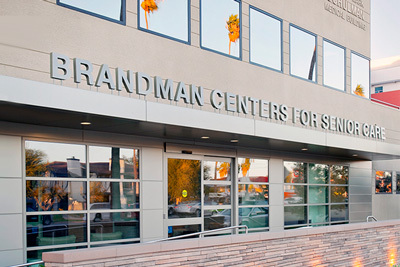
The Award-Winning Los Angeles Jewish Home Earns Accolades and Celebrates Success
In the best of times, providing world-class senior care and leading-edge health education is a tall order. During a global pandemic, the hurdles to success are even higher. Yet, the Los Angeles Jewish Home continues to rise to the challenge, gaining significant recognition for its outstanding work. Two of its most recent honors acknowledge the Jewish Home's dedication to excellence across multiple fields of endeavor.
This month, the California chapter of the National Association of Social Workers (NASW) selected the Jewish Home's Brandman Centers for Senior Care (BCSC), a Program of All-Inclusive Care for the Elderly (PACE), as its 2021 Organization of the Year. This prestigious award will be conferred at the NASW-CA's annual conference, to be held virtually in October.
"I could not be prouder of our social work team, who more than earned this great honor," says BCSC Executive Director Susie Fishenfeld. "It's a tremendous privilege to work with such dedicated and compassionate professionals. They do an outstanding job making a difference for our participants and their family members every single day."
"Our program is community-based, so our approach to COVID had to reflect that," says Carolyn Quinn, BCSC's social work lead. "We kept our doors open throughout the pandemic to ensure participants had access to our clinics and therapies. It required incredible dedication, and a lot of smart and creative thinking, to make it happen, and I feel very fortunate to be surrounded by such amazing colleagues. They're really just the best people."
That creative thinking required going above and beyond the normal role of a social worker. "At BCSC, we help make it safe for our seniors to remain in their homes," Susie notes. "During COVID, especially for the first several months, that meant working hard to meet participants' most basic needs—like, for those not able to travel into the center, bringing them food and basic items such as toilet paper so they wouldn't have to leave their homes."
The social workers' responsibilities also included initiating challenging conversations. "Fifty percent of our participants have dementia. We reached out to their families and put plans in place for what would happen if their loved ones ended up in the hospital. It broke my team members' hearts to have to have those calls, but people appreciated the frankness, and I was so proud of my team's attitude, which was, "This is hard, but we're going to do whatever it takes for our participants and their families to be well," Carolyn says.
The Brandman Centers for Senior Care is not the only Jewish Home organization earning accolades for high achievement. In July, the Annenberg School of Nursing made it onto the list of top three nursing schools in California, as ranked by practicalnursing.com. The ranking reflects data on first-time successful pass rates for the state licensing exam, overall student support services, and program elements more easily streamlining students toward achieving licensure. "Words cannot express my pride and gratitude for having reached this milestone, which is the result of the collective efforts and the continued leadership, drive, and commitment of our entire staff," says Amandeep Kaur, director of the Annenberg School. "I wish all of my colleagues a hearty congratulations."
Over the past year, the need for qualified, expert nursing care has skyrocketed. Fortunately, Amandeep says, COVID-19 has not put a damper on the Annenberg School's meteoric rise. "Ensuring we are consistently following all public health guidelines, our LVN class remained full despite the pandemic, and we are thrilled to be in a position to be training new nurses during a time of such critical demand," she says. Among the factors driving such steady student enrollment: a focus on ongoing opportunities for real-world experience. "At this point, many nursing schools have turned to online clinical instruction, but we're still doing hands-on training to ensure our students are prepared for what's waiting out in the field," she says.
The Jewish Home salutes the Brandman Centers for Senior Care and the Annenberg School on their impressive accomplishments. May they go from strength to strength!
Apr
5
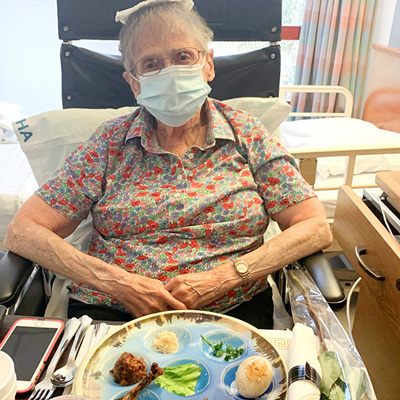
The Promise of Passover at the Los Angeles Jewish Home
Passover is always one of the most important holidays on the Jewish calendar, and for seniors at the Los Angeles Jewish Home, this year's celebration was something extra special.
"During Pesach, we tell the story of our People's liberation from slavery in Mitzrayim [Egypt]. This year, it coincided with the anniversary of our own journey through COVID-19," says Skirball Director of Jewish Life Rabbi Karen Bender. "Just like Mitzrayim, COVID has been a dangerous and confining place. And though we're still not quite through the pandemic, things are starting to open back up, the same way the waters parted for the Jewish people at the Red Sea."
This Passover was a particularly meaningful time for Jewish Home residents, who endured long months of uncertainty as the coronavirus swept across Southern California. Here, Rabbi Bender points out another parallel between the Exodus and modern day.
"Ultimately, Passover is a joyful holiday, and right now at the Jewish Home, we are also feeling a sense of real joy," she says. "Our ancestors knew what it meant, after great struggle, to strive toward the Promised Land. Now, we too, can finally see it emerging in the distance. That is cause for optimism and celebration."
To mark the occasion, Rabbi Bender spent the holiday doing something she had not been able to do for 12 months: gathering in person with Jewish Home residents—in small groups—to teach about Passover and to give the Home's seniors a chance to reconnect.
"To be extra cautious, we kept residents in their cohorts and I visited each floor of our buildings to help people study the Haggadah," she says. "It's such a rich and interesting text— you could easily teach a four-semester course at the college level about it!"
The experience, she says, was incredibly moving. "We began class by saying a Shecheheyanu prayer, expressing our thanks for being together again," she says. "Seeing people's relief and excitement was just amazing."
Rabbi Bender and her colleague, Eisenberg Village Campus Rabbi Ronald Goldberg, helped residents observe the holiday in other ways, as well. Since large group gatherings have not yet been deemed safe, the rabbis broadcast a seder, the traditional Passover meal, on the Jewish Home's closed circuit TV station.
"We made sure there was a seder plate in every hand, which meant distributing nearly 1,000 of them to our residents," Rabbi Bender says. "As they watched the seder, they were able to participate along with us—dipping parsley in salt water, making the Hillel sandwich and singing the Four Questions."
In preparation for the holiday, Rabbi Bender also led other Passover rituals. "This year, I was able to burn the hametz [leavened products], which to me was another sign that we're starting to return to normal," she says. "In addition, we had a massive cleaning of the Jewish Home's kitchens. Our mashgiach [an authority who supervises the kashrut status of a kosher establishment] says no other organization he's ever worked with is as skilled or dedicated to koshering for Pesach. It's an amazing sight to see."
After such a challenging year, Rabbi Bender was thrilled to see life at the Jewish Home start to resume a more regular pace. "We're going from holy to holy—transitioning from the holiness of protecting our residents and making the sacrifices needed to stay safe, to the holiness of taking tiny steps toward leading a more normal life," she says. "To see residents once again greet each other in person and wish one another a 'Zissen Pesach,' a sweet Passover, was an unbelievably heartwarming experience."
Apr
5
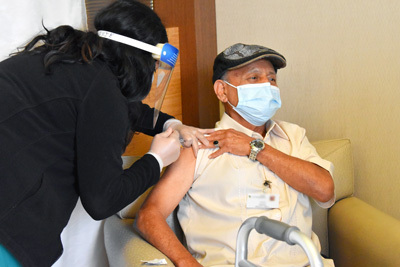
Doors Open During Pandemic, Brandman Centers for Senior Care Offers Key Support for Seniors
As the pandemic took hold and impacted especially vulnerable populations across Los Angeles, one of the city's leading senior health and wellness facilities continued to be a stable source of support for the men and women in its care: the Brandman Centers for Senior Care (BCSC), a Program of All-inclusive Care for the Elderly (PACE).
Located on the Los Angeles Jewish Home's Grancell Village campus in Reseda, BCSC is a vital resource for nursing home-eligible seniors who are still able to live safely in their own homes, but may require special services. They turn to BCSC for a myriad of services including medical and psychological care, medical transportation, rehabilitation, social services, adult day activities, nutritional counseling, preventive health support, and more. During COVID-19, BCSC continued providing those services, playing an essential role in helping seniors meet their most critical needs.
"It's been a challenging time for our seniors, and they have depended on us for assistance," says Alicxa Manchan, BCSC's director of marketing. "The day center has remained open throughout the pandemic, but in a limited capacity, providing a safe place for participants at risk or those who's at-home caretakers were essential workers. We also saw participants in our clinic and therapy department, and kept in close contact with the seniors who were no longer coming to the day center but still relied on our care."
BCSC serves roughly 250 seniors on an ongoing basis; they have a median age of 80. Over the past year, the center continued enrolling new participants, working tirelessly to ensure they were staying healthy and connected to their community.
"For our seniors who were at home, we had to think out of the box about how to run our programs remotely, so we got creative, sending them all sorts of in-home activities and exercises to make sure they were staying mentally engaged," Alicxa says.
Some participants who are able to navigate technology were provided with devices equipped with FaceTime or Zoom that allowed them to access activities and complete their medical appointments using telehealth. BCSC also ensured seniors were well nourished and that they remained current with their prescription medications by sending participants meals to their homes every day and arranging for in-home medicine delivery.
Additionally, BCSC made certain that participants were able to receive vaccinations. "We had a drive-thru flu vaccine event in the fall, where seniors could be driven up, receive their shots, and head back home," Alicxa says. "And as soon as COVID-19 vaccines became available at the Jewish Home, we called participants to get them scheduled. We were so pleased to have over 90 percent participation."
Mobility can be difficult for BCSC participants, Alicxa notes, and center staff are invaluable in helping them get around. "For those who needed it, we provided transportation to all appointments at the center in order to make things as easy and seamless as possible," she says.
Focus on service is a key component of BCSC's appeal. "The major reason people enroll in our program is access to care," Alicxa says. "Our participants tell us in a normal Medicare Advantage plan they get maybe five or 10 minutes with their doctor. Our physicians here will often spend up to an hour with a patient. BCSC is also a one-stop shop—we have physical therapy on one side, our wellness clinic on the other, and in the middle is our center where we are running fun activities and serving meals. The other thing our participants love is the social aspect: engaging in activities, meeting peers, making friends. It's a wonderful way to spend their day."
As the pandemic shows the first signs of waning, all are eagerly looking ahead to a time when larger numbers of participants can once again gather at BCSC. "We're already developing schedules and devising ways to bring people onsite for our regular programming while maintaining social distancing," she says. "We can't wait to have them all back!"
Mar
18
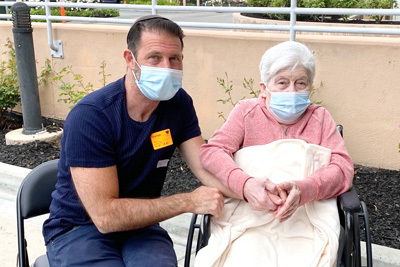
Resident Life Joyfully Reopens at the Los Angeles Jewish Home
Jewish Home resident Michaela Mendelovici enjoys a heartwarming visit from her loving son, who came all the way from Israel.
With COVID-19 in retreat in Southern California, residents across Los Angeles including those of the Los Angeles Jewish Home are joyfully reemerging from quarantine and turning the page on a long and challenging year. A sense of normalcy is returning to life at the Jewish Home—and residents are eagerly soaking it in.
"There's tremendous excitement among our residents, who are so ready for a resumption of physical contact with their friends and loved ones," says Larissa Stepanians, chief operating officer of the Jewish Home. "As we come out of the dark tunnel of the pandemic, we're finally able to glimpse a light at the end, and it's definitely created an intensity of emotions."
Those emotions run equally high among residents' family members. "Now that we are both vaccinated, I love that I can finally be with my mom and see she is doing well," says Suzanne Berman. Her mother, Michele Pakula, is a resident of the Home's Goldenberg•Ziman Special Care Center for seniors with Alzheimer's disease and age-related dementia. "The pandemic was very hard, but my mom is a Holocaust survivor. If you can survive that, you can make it through anything."Jewish Home resident and Holocaust Survivor Michele Pakula holds hands with daughter Suzanne Berman as they reunite for an in-person visit.
Janet Bramson, whose mother, Florence Kay, also lives at the Jewish Home, was feeling a similar swell of happiness. "After not being able to see my mom for months, my whole family came to visit, and I feel like we were able to breathe new life into her," Janet says. "We visited and laughed and just had such a warm, wonderful time."
In addition to increased visitation, residents are slowly and safely embracing other pre-pandemic activities, as well, from religious services, to beauty shop appointments, to light gardening. Throughout the reopening, the Jewish Home is closely adhering to California Department of Public Health (CDPH) directives.
"There are numerous state and federal agencies issuing guidelines related to COVID-19, and we are required to follow the most stringent, which is CDPH's guidance," Larissa says.
With its beautiful, landscaped grounds, the Jewish Home has natural advantages that make navigating CDPH mandates easier than it might be at many other facilities. "Our campuses, which consist of between seven and nine gorgeous acres between Eisenberg Village and Grancell Village alone, lend themselves to outdoor activities," Larissa says. "Our residents can soak up the sunshine, sit and read a book, or take a lovely walk often with an aide. Of course, while they're out and about, we ask them to wear personal protective equipment (PPE) to protect themselves and others."Suzanne shows Michele photos of relatives, making up for lost time.
As residents venture beyond their rooms, Jewish Home staff members are working harder than ever, adjusting protocols to suit the new, more relaxed environment. Their primary focus is ensuring residents remain safe and healthy, which means sticking to the Home's comprehensive mitigation plan.
"Every building at the Jewish Home has a plan that includes extensive infection control practices, staff training, and detailed visitation policies," Larissa says. "It's one of the reasons our facilities have done so well throughout the pandemic."
Given the Home's success at reopening thus far, Larissa foresees even more opportunities on the horizon. "We're now looking at bringing back communal dining in a fuller capacity, and eventually we hope to resume some off campus activities, like taking residents shopping," Larissa says. "These things take time to implement, and our residents and their families have been incredibly understanding. But I think we're getting closer—so stay tuned!"
Michele and daughter Suzanne hug during an in-person visit.
Mar
16
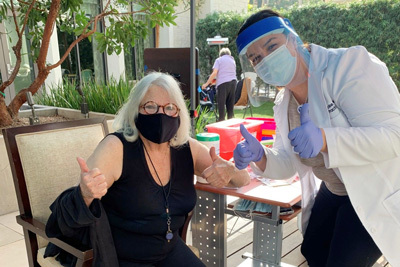
Fully Vaccinated Los Angeles Jewish Home Residents See Hope on the Horizon
Across the country, people are signing up for the COVID-19 vaccine, as they meet the criteria, and hoping it brings with it the beginning of a return to normal life. Residents of the Los Angeles Jewish Home are similarly optimistic, buoyed by having received both doses of the Moderna vaccine and eager to resume activities that bring them into closer contact once again with their families, their friends at the Home, and those who care for them each day.
"Ninety-nine percent of our residents, and approximately 80 percent of our staff, have now been fully vaccinated," says Noah Marco, MD, chief medical officer of the Jewish Home. "We did it efficiently and safely, which is a hallmark of how we operate here at the Jewish Home."
The speed with which Jewish Home administrators were able to secure sufficient quantities of the vaccine is a testament to the organization's skill, experience, and track record of success, Dr. Marco says. "We were very confident, based on our pre-planning and our relationships with the state and the county, that we would have enough vaccine for everyone. It took the average person at the Jewish Home less than 15 minutes from the time they showed up to receive the second dose, whereas many people across the city and around the country have to give up several hours of their day, if they can even obtain a vaccine in the first place."
Of course, even with the vaccine, the Jewish Home is treading carefully and thoughtfully, following all health and safety guidelines to ensure residents' and staff well-being as the pandemic stretches into its second year. But, many residents say, inoculation has definitely helped lift their spirits. "I feel like there is a light at the end of the dark tunnel," says Elaine Cohen, a resident of Joyce Eisenberg-Keefer (JEK) Medical Center on the Jewish Home's Grancell Village campus. "I will someday be able to reunite with family." Elaine's fellow JEK residents share her positive outlook. "I have a sense of relief and feel honored to have received the vaccine," says Indrani Mahaindra. "This is the beginning of the end of this horrible pandemic." Hersz Alterman notes how thankful he is that a vaccine was developed in such a record-breaking amount of time. "I'm grateful and appreciate science for creating the vaccine," he says. "Thanks to these incredible researchers, I will someday be able to hug my only granddaughter."
On the Eisenberg Village (EV) campus, residents are also starting to breathe a sigh of relief. "Our last two Town Hall call-in meetings with Jewish Home staff have been even more upbeat and positive, giving everyone a glimmer of hope," says Judith Karon, president of the EV Resident Council. "Residents are thrilled to see things beginning to reopen, like physical therapy and the campus beauty salon."
Sandy Fine, who has taken on a leadership role with EV's resident-run post office, says the response to the planned reopening has been phenomenal. "People really want to be part of it," she says.
Those people include residents Howard Krupnick and Norma Garber. Howard, a new post office volunteer, says he is "happy to have a job and to be helping out at the Jewish Home." As for Norma, she is delighted about finally being able to return to the Arts & Crafts room. "I was so ready for it," she says. "This is my happy place!"
Mar
16
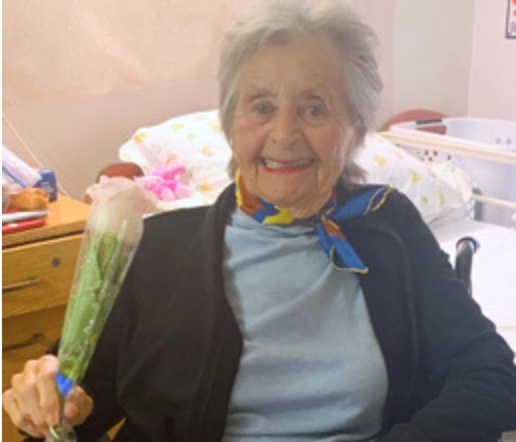
Los Angeles Jewish Home Residents Contemplate the Meaning of Passover After an Unprecedented Year
Spring is upon us, bringing flowers in bloom, longer days of sunshine, and fresh optimism and hope to the Los Angeles Jewish Home. This year, the end of winter coincides with a cautious hope around the gradual tapering off of the COVID-19 pandemic—coming at a powerful time as we prepare to welcome Passover, a holiday that celebrates themes of liberation.Photo taken during last year's Passover celebration.
Passover has always been a special time at the Los Angeles Jewish Home, dating back to the organization's beginning more than a century ago. In 1912, a small group of caring neighbors gave shelter to five homeless Jewish men at Passover, and the Jewish Home was born. Local grocer Simon Lewis, one of the Home's founders, was haunted by the "forlorn old people without family, friends, or shelter standing within our gates, pleading for our assistance." The Jewish Home was a refuge where these seniors could find critical support.
Lewis and his fellow co-founders could scarcely have dreamed what the Jewish Home would one day become: one of the nation's preeminent providers of senior care, serving 4,000 men and women annually. From its humble origins, the Jewish Home has grown into a recognized leader in programs and services designed to ensure elderly Americans' robust physical and emotional health.
This Passover, the Jewish Home is beginning to experience a slow and safe reopening of its vibrant residential life. As they contemplate the unprecedented year just passed, Jewish Home residents see key parallels with the holiday and its deeper meaning for how we live our lives.
"The pandemic has been challenging, but I am very grateful," says Connie Robin, a resident at Fountainview at Gonda Westside and chair of the facility's Jewish Life Committee. "I feel blessed to live in a country where I'm free to live Jewishly. I'm also grateful to be living at Fountainview at Gonda Westside during this time. Had I been in my own home during COVID, I would have been very lonely."
Eisenberg Village resident Joy Snyder acknowledges the difficulties presented by the pandemic, but says Passover is a perfect time to gain some perspective. "There is always hope in life, even if sometimes it is a little slow in coming," she says. Just as the ancient Israelites needed to bide their time to escape Egyptian slavery, so, too do we need to have a little patience as we wait for our current predicament to pass. "It can be a struggle, but we need to roll with the punches and try to keep our psyches up and a smile on our faces," Joy says.
Photo taken during last year's Passover celebration.
For Joy's fellow resident Harriet Rosenberg, the holiday is an opportunity to anticipate what life will be like once the coronavirus is finally behind us. "To me, Passover is a time for being with family," she says. "As much as the Jewish Home does to help everyone celebrate the holiday, I look forward to being with my family again!"
Doris Gould, who lives in the Joyce Eisenberg-Keefer (JEK) Medical Center on the Jewish Home's Grancell Village campus, concurs. "Passover means getting together with friends and family, celebrating freedom and being able to sing with joy," she says. As the pandemic begins to recede from view, she is eager to add her voice to a triumphant chorus of loved ones sharing food and laughter at the same holiday table.
Another JEK resident, Shirley Landau, is channeling her Passover energy into practical prayers that echo the holiday's narrative of a partnership between God and man. It takes Moses and the Israelites to put God's Exodus plan into motion—a collaboration that results in eventual success. "I used to pray for God to take away the pandemic," Shirley says. "Then I switched to asking God to give man the brains to create a shot to make us safe. That's God's way of doing it."
The prayers seem to be paying off. "I got both shots!" says Shirley, who—like 99 percent of all eligible residents at the Jewish Home—benefited from the Home's rapid vaccine rollout.
For Shirley and her fellow residents at the Jewish Home, this year Passover is coming at the right time, as we celebrate liberation in its many forms.